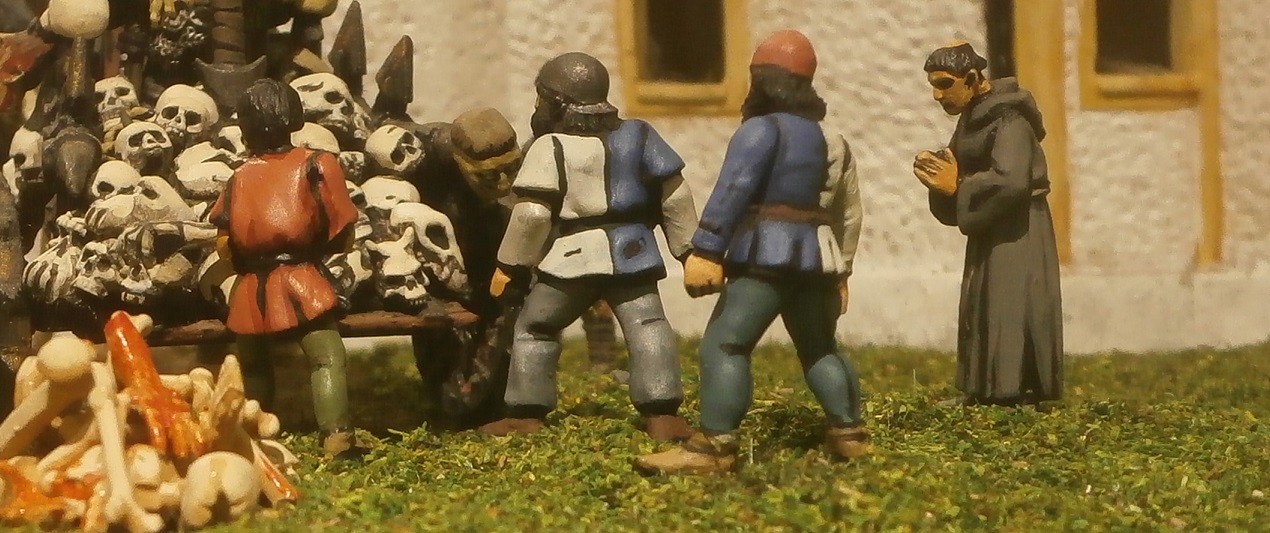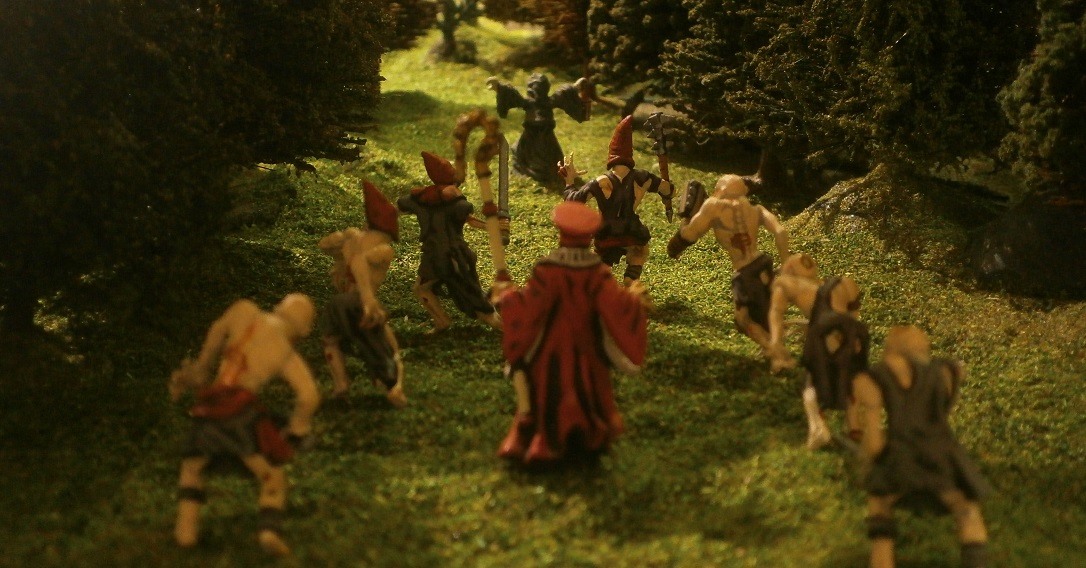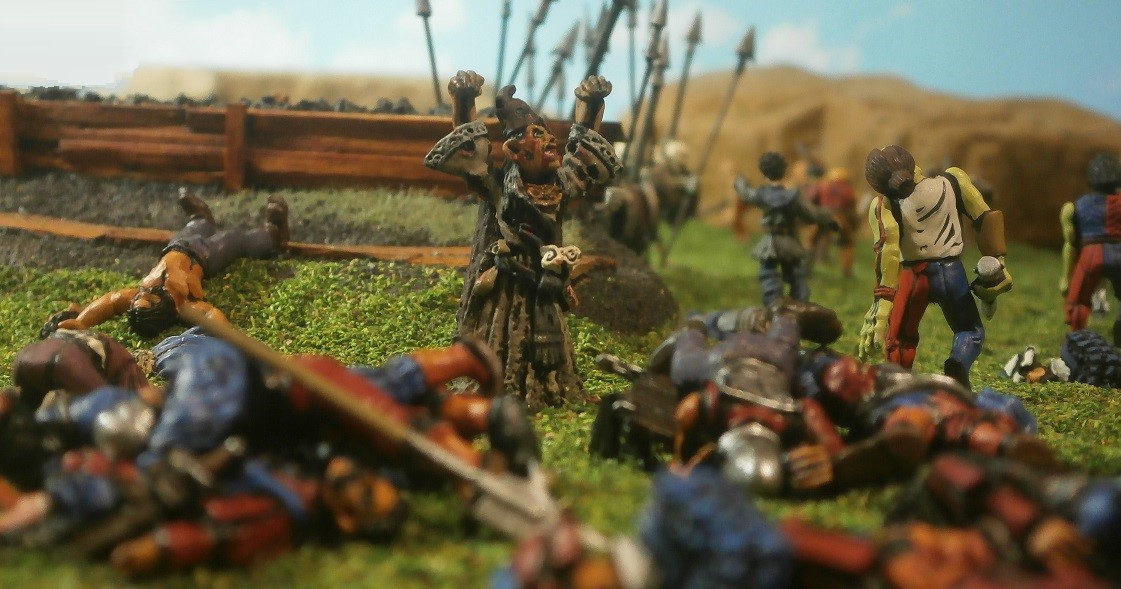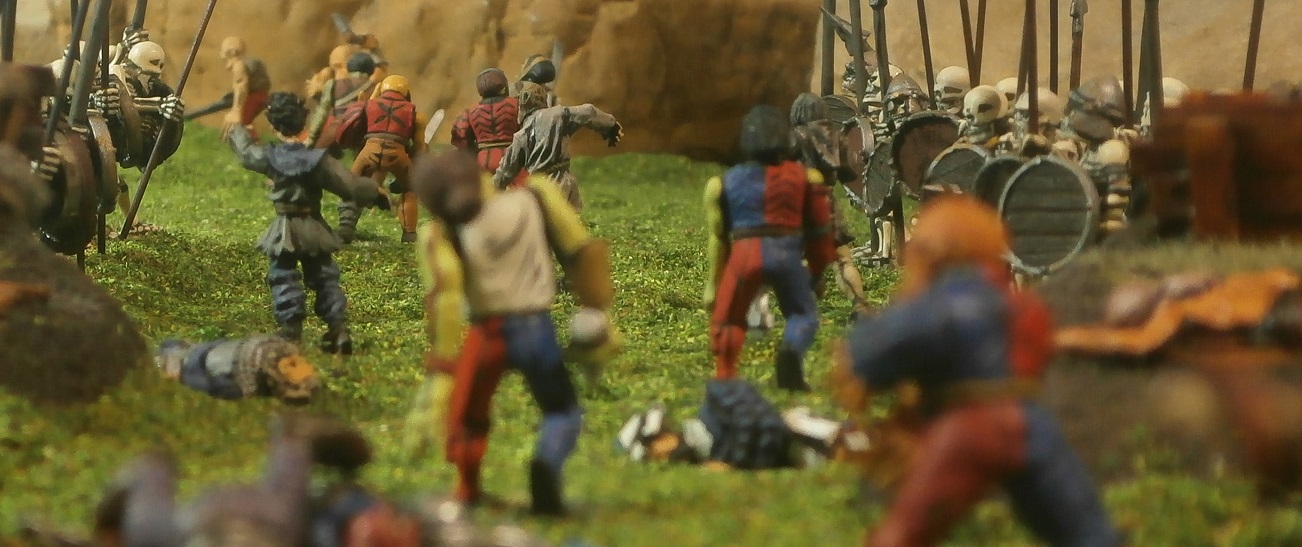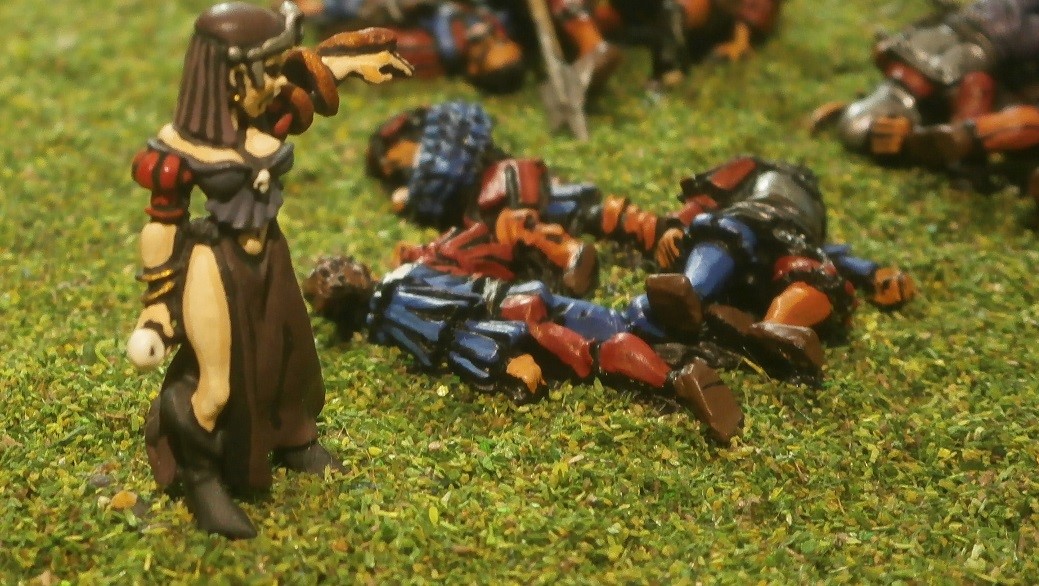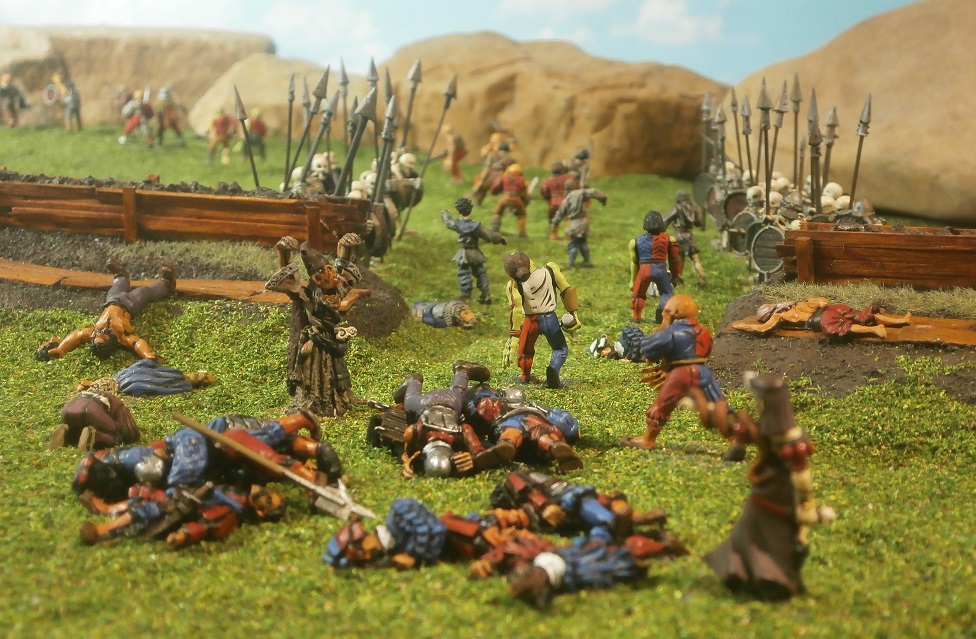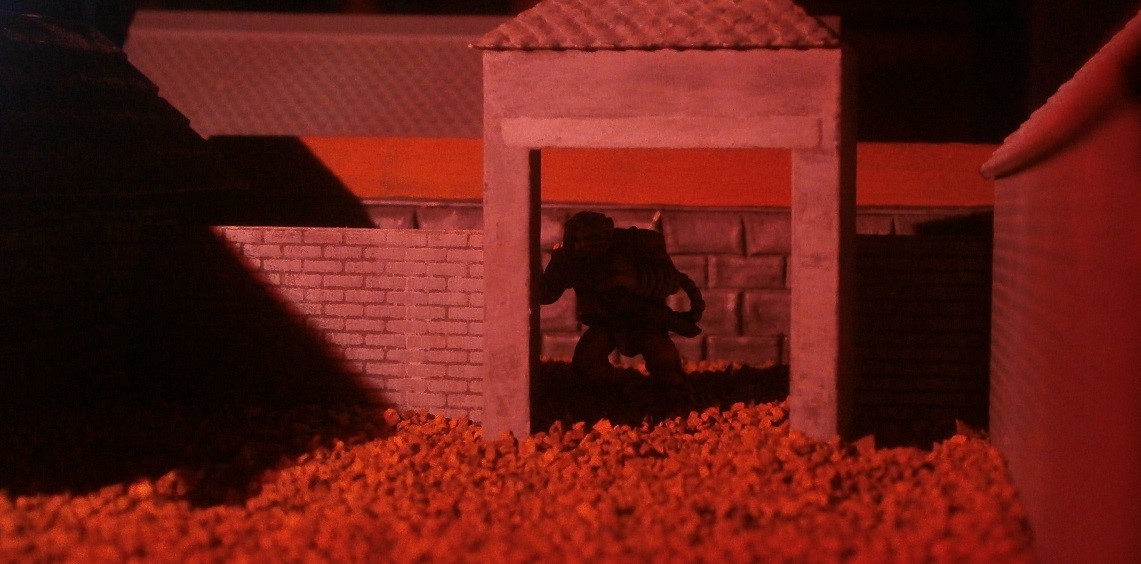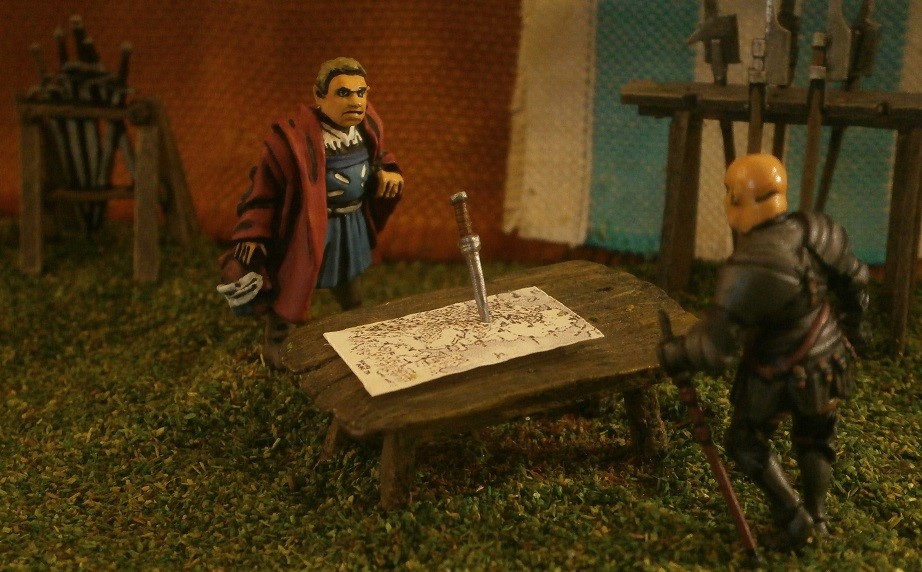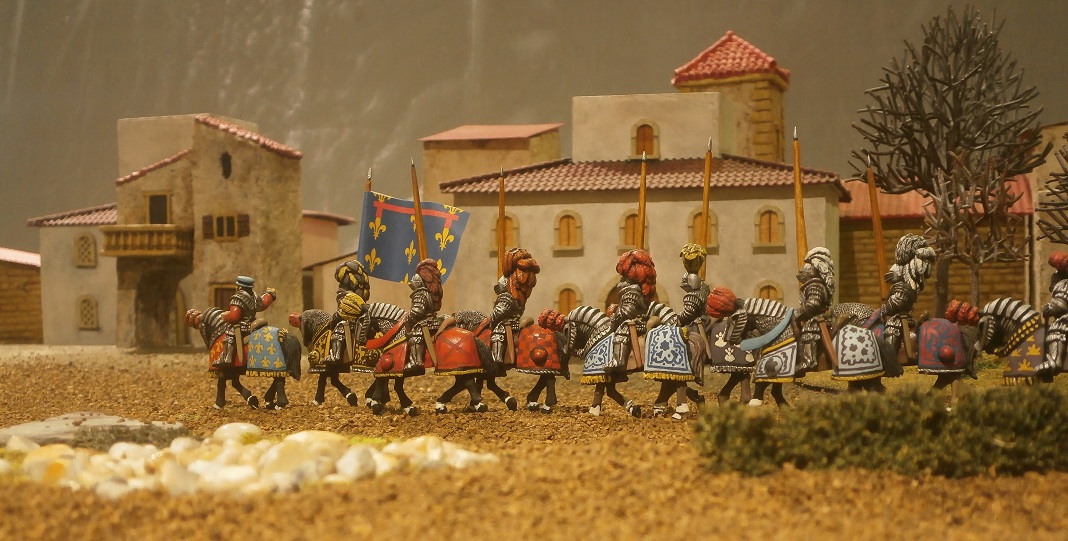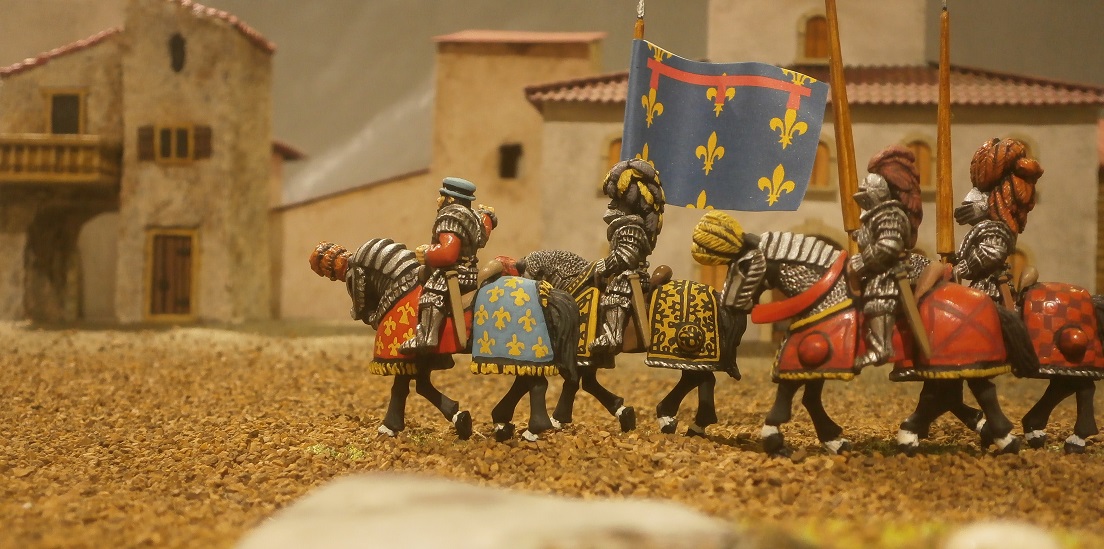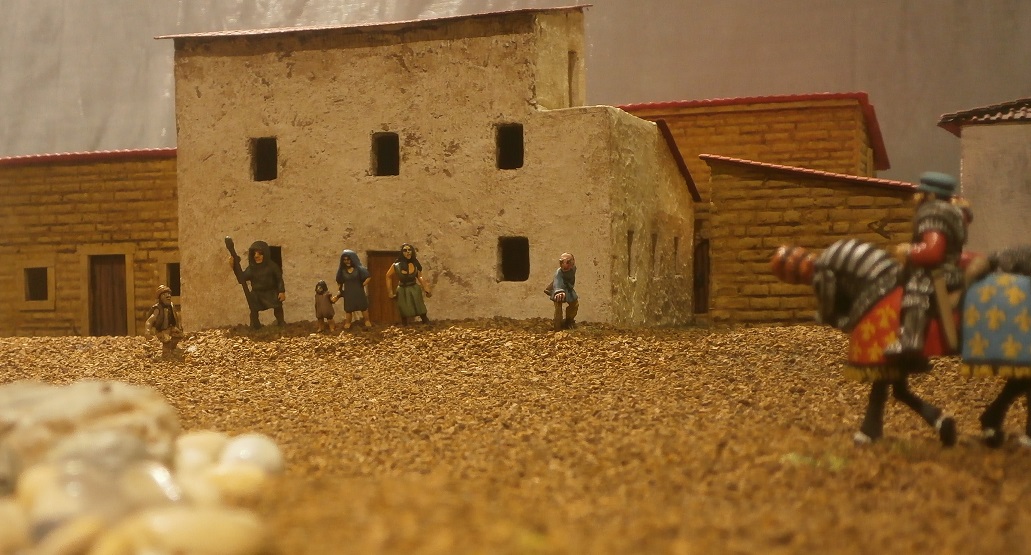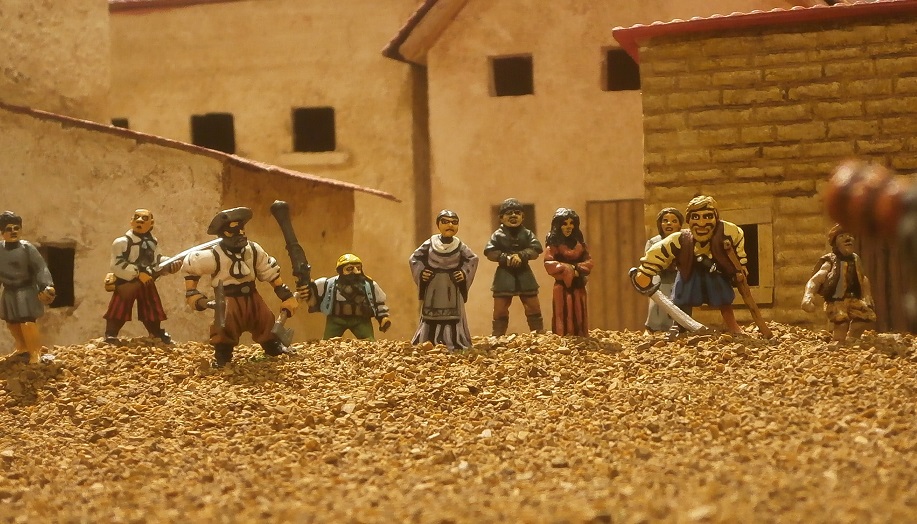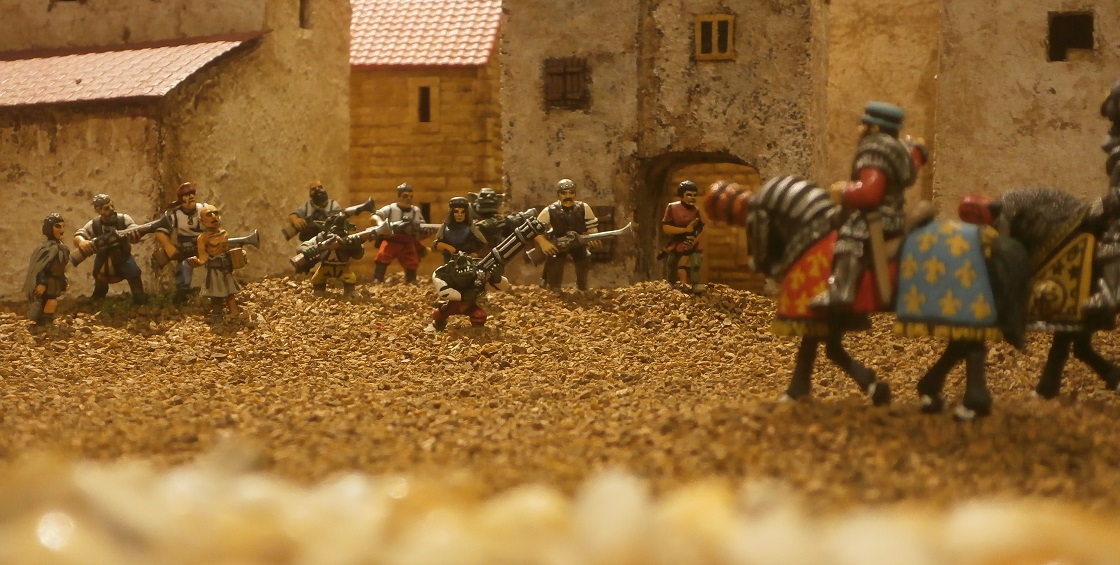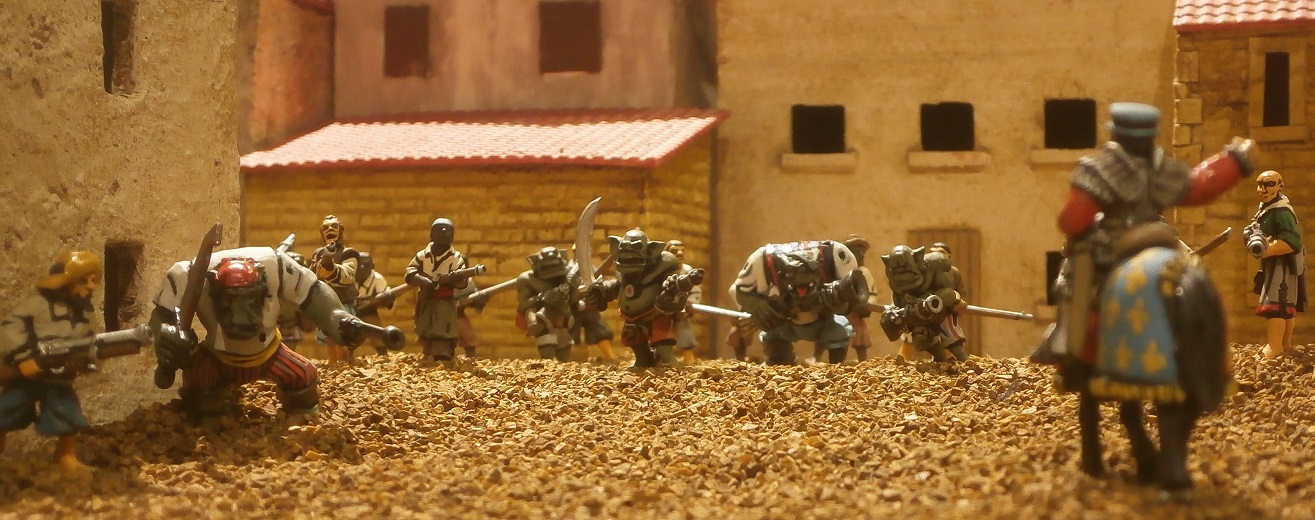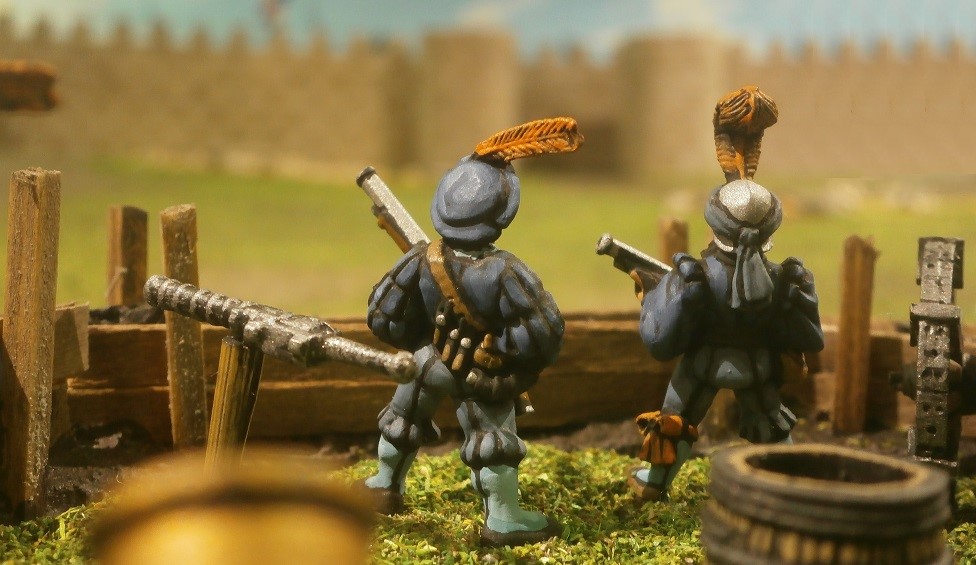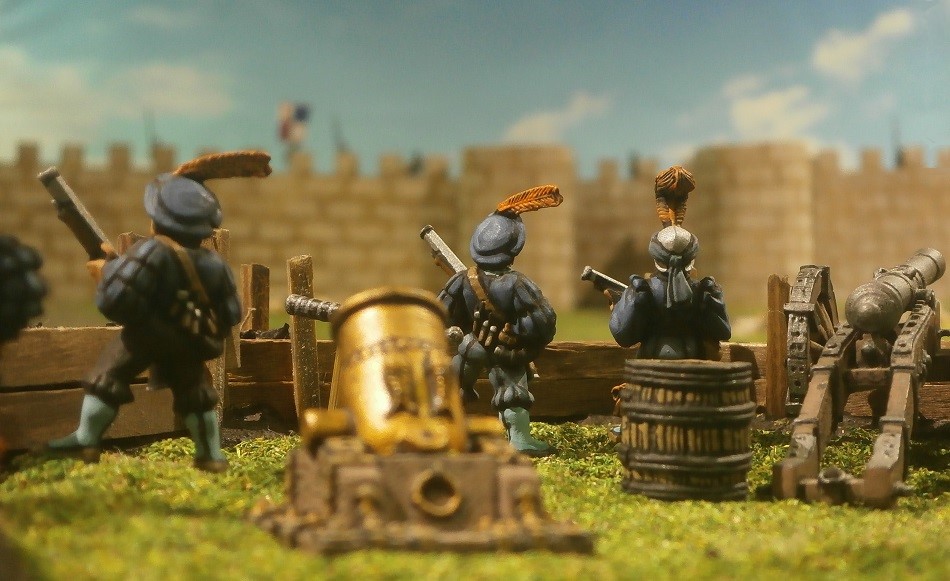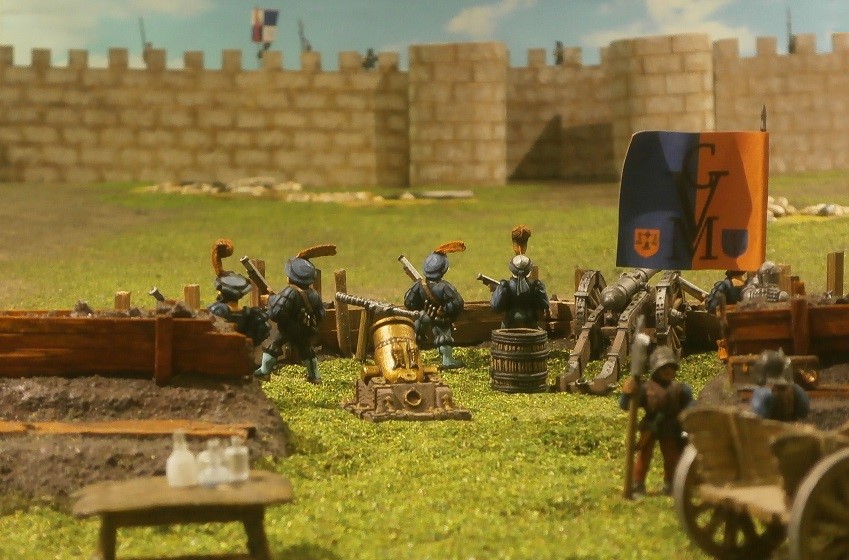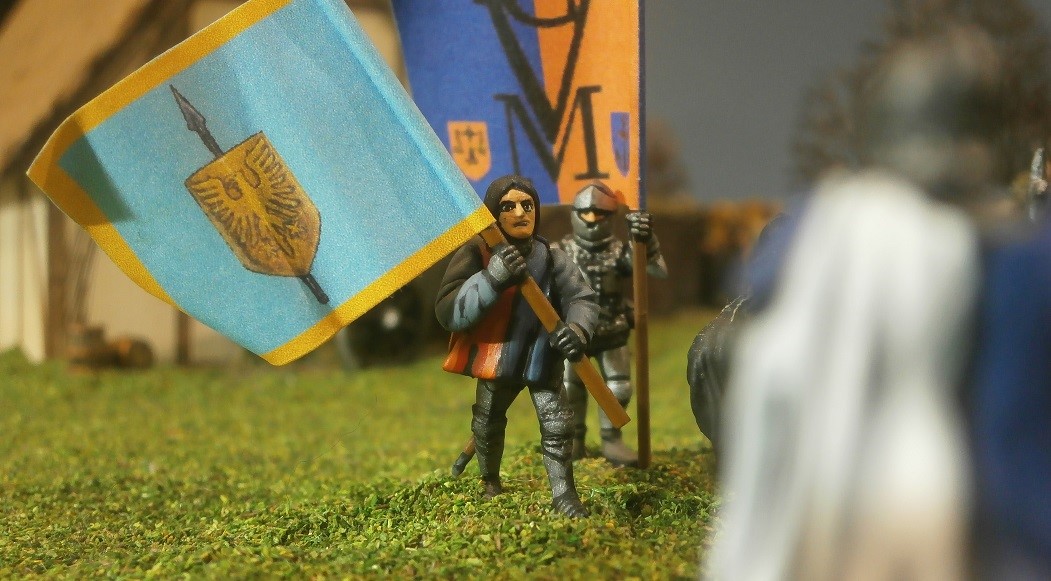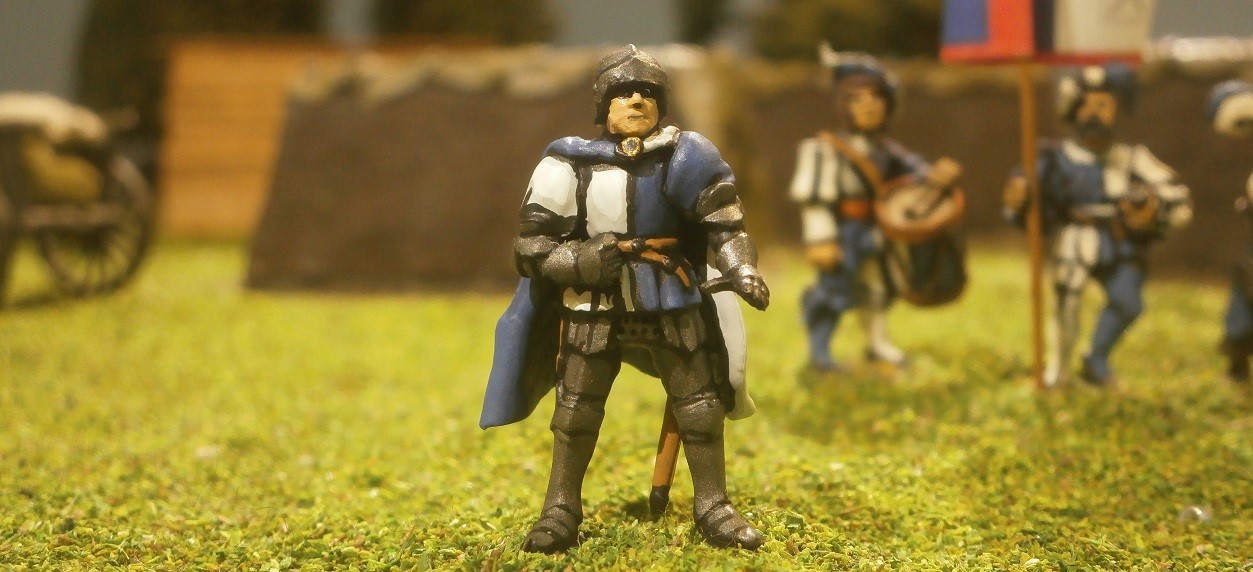Thanks Lands Annex. RL swallowed all of my time through January, but I am back on track now!
-------------------------------------------
By Your Leave
Before the Walls of Pavona, Winter IC 2403-4
“Still hungry?” asked Jorien absently as he picked at a spot of rust in his handgun’s pan.
Nikolaas groaned. “Please, not again,” he said. “It’s not funny anymore.”
“I never said it was. But at least it was a new joke when I first said it.”
“What?” asked Nikolaas, shaking his head.
“Well, we’ve never been hungry before in Tilea. The company has always kept our bellies full, ‘til now. Fleshmeat twice a week, sometimes more’n that, fish a-plenty, and if not beer to lull us to sleep and ease our aching limbs, then wine in lieu of it. And not bad wine, either. Even when we took on the orcs and gobs, we always fought with a good breakfast inside us. These last two weeks it’s been biscuit and pottage, in meagre portions, and not scrap of flesh.”
At first, it seemed Nikolaas would not answer, perhaps in protest at Jorien’s annoying joke, but it turned out he was merely pondering things.
“Do you think
they have wine?” he asked, pointing at the walls. “And food?”
Jorien looked back at the walls too. “They must have, otherwise they’d have sallied out by now, or someone would have tried to take supplies in. They’ve an army in there, good sized too, as well as all the citizens. That’s a lot of mouths, yet it’s been more than five weeks now and they’ve done nothing but shuffle about on the walls, waving flags now and again.”
“I heard there was some shooting last Tuesday,” said Nikolaas.
“That’s because half a dozen new arrivals were trying to creep in, so the handgunners on the walls wanted to lure our attention elsewhere. The sneaky sods got in quick too, helped by the fact they had little with them – certainly no supplies of any consequence. Besides, the Pavonans
can’t take in supplies when there’s none to be had. They must’ve already taken everything in from miles around while we were trying to cross the river. ‘Twould explain their lack of concern about our blockade.”
Nikolaas shook his head. “I don’t they think they did. I’ve been out scrounging three times now, and good deal off a-ways too. Every place I saw, big or small, looked to have been dead for some considerable time, ghostly-quiet. Wim reckons the ogres razed everything but the city last year and the Pavonans have been suffering ever since. He said that’s why the Pavonans robbed Verezzo.”
“I can’t argue with that,” agreed Jorien. “You only have to look at the walls to see why the ogres didn’t even try to assault the city. They are the most substantial walls I’ve seen in Tilea, and I’ve seen a few.”
“If their land was razed completely,” said Nikolaas. “That’ll mean they’ve had no harvest, nor swine or kine to butcher. They must be living off whatever they robbed from Verezzo. And I doubt that’ll last much longer. They even lost some of the Verezzan loot trying to cross the river before we got to them.”
“Just a matter of waiting, then.”
The two of them fell quiet for a while, staring at the walls, which just happened to be exactly what they were supposed to be doing.
Then Jorien piped up again, “Why do you keep getting picked to go scrounging?”
“Don’t start complaining. I already told you there’s nothing to be had out there.”
Jorien frowned. “It’d get me out of these works for a change of scenery and a stretch of my legs.”
“The sergeant has nothing against you, Jorien. He picks my file because he knows we did a good job the time before.”
“And the time before that. And the time before that,” said Jorien. “At this rate no-one else will ever get to go. I wonder if he’ll pick you to go out when he wants a forlorn hope, what with you proving how good your legs work?”
Nikolaas grinned. “No, he’ll pick your file because he knows you’re good at staying put.”
“Very funny,” said Jorien.
The two of them then noticed a little more movement on the walls than usual and went quiet for a while they watched to see if it looked likely to amount to anything. When nothing much seemed to come of it, Jorien continued the conversation.
“You know, when you think about it, philosophical ‘n all that, we’re here because the Pavonans robbed Verezzo. But if they only did that because the ogres robbed them, then the ogres are the real reason we’re here. You know I’m not the biggest fan of Tileans, but it was the ogres who started this mess.”
“The ogres were always the reason we came north,” said Nikolaas. “Them and the unmentionables. But we’re not here because the Pavonans robbed Verezzo, we’re here because they then told the world that
we were the robbers. General Valckenburgh can’t have people slandering him, and the company won’t profit if no-one trusts us to trade with.”
“Then profit’s the real reason, as it always is,” suggested Jorien. “It’s gold that drags us across the world, though we ourselves only ever see silver, and that rare enough. You know, we should be being paid almost full wages right now. They can’t deduct much for meat and drink when it’s little more than biscuit and peas, and while we tarry here, they aren’t giving us shoes in lieu of pay either.”
Nikolaas tutted. “Find a better complaint, Jorien. There’s nothing to spend silver on while we’re stuck in these works. We don’t have to pay for the view.”
“I’ll grant you it is nice to look at.”
As Nikolaas smiled at this they both looked out at the city again. The walls remained strong, which might not have been the case had the VMC’s guns been plying iron against them. Instead, for want of orders rather than powder or shot, the guns had remained almost wholly silent. The gunners had been told to fire upon any who tried to leave or enter, and otherwise do nothing but be ready. A stalemate had thus set in, then dragged on. As it was winter, the northerners in the army, mostly Marienburgers and mercenaries from Middenland, Reikland and Westerland, could at least be thankful they were not too hot, as they surely would have been had it been six months earlier.
“Wait a moment,” said Jorien, suddenly and loud. “What’s all this?”
A little party of men had emerged from one of the sally ports, preceded by an ensign sporting a white flag.
“Looks like someone wants to talk,” said Nikolaas.
“Well they took their bloody time about it,” complained Jorien.
…
As the party drew close to the siege works, it became clear that Duke Guidobaldo Gondi’s son, Lord Silvano, had been tasked with the negotiations. The armoured nobleman who approached was far too young to be the duke yet was accompanied not just by the white flag of truce but the ducal banner also - apart from the duke, only his heir would be allowed to do so.
Lord Silvano had already acquired fame as a brave commander, a dutiful son and for dedication to the war against the undead, despite his young years, and despite also losing his older brother in the war against Prince Girenzo of Trantio. He was with the holy army serving the arch-lector Calictus when they assaulted Viadaza, and drove the vampire Lord Adolfo from the city, and by all accounts acquitted himself well in the fight. It was his men, along with the enslaved soldiers of Campogrotta, who had murdered the ogres marching with the holy army, but it was generally accepted (as indeed it was by the court martial held at the time) that he was not at all responsible for their actions, neither ordering, assisting or by deliberate inaction allowing them to do what they did. After much of his army was ordered south by his father to help in the war against the tryant Boulderguts’ double army, he himself rode with his Sharlian riders to further assist the arch-lector of Morr, Calictus II, in the holy war. He was at the Second Battle of Ebino when the arch-lector died, having charged deep into the terrible foe and later escaping the field with the mere handful of his elven riders who survived. He made his way south and was reunited with his father just in time to join the Reman/Pavonan allied army that pursued the ogres from Pavona and then prevented their approach on Remas at the bloody Battle of the Diocleta, where he sought the fiercest of the fighting and was badly wounded leading a charge against a body of mournfang mounted brutes. His recovery took several months, in Remas, while his father failed to catch the ogres, but as soon as he could ride in armour again, he joined with the grand alliance army commanded by Lord Alessio of Portomaggiore and was present the Battle of the Valley of Death in the necropolis of Norochia. Only after all this had he returned to Pavona, ordered by his father to do so in case the ogres had circumnavigated the allied army to return southward and finish what they had begun.
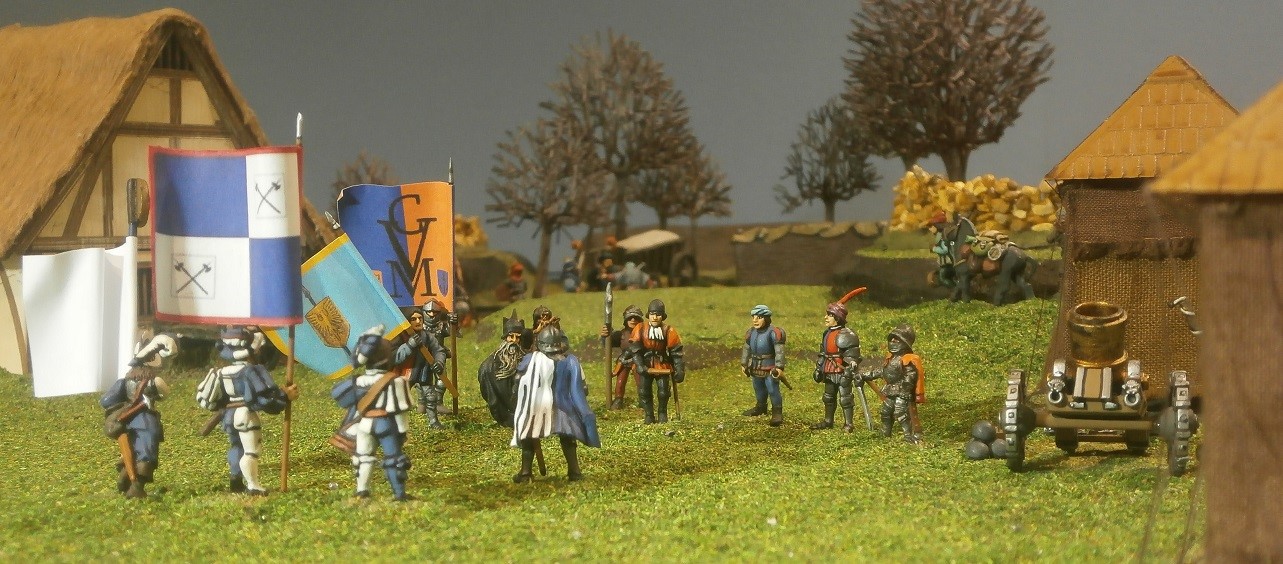
When the young lord was brought before General Valckenbugh and his officers, however, he began by saying little of himself or his past deeds, other than that he was his father’s sole surviving son and wished only to serve his father loyally. This elicited much angry muttering from the officers, but Valckenburgh silenced them with a mere look.
"You yourself do have the reputation of being an honourable nobleman, and a courageous fellow to boot,” said the general. “In light of events, I might well have baulked at speaking with your father. As it is you, however, I am willing to listen to what you have to say, despite suspecting it is your father’s words you must deliver. Before you proceed, sir, know that I will not brook one more Pavonan lie. Have a care to speak only that which you know or wholly believe to be the truth.”
Lord Silvano showed no sign of displeasure at the implied accusation. Perhaps once a person has faced the living dead in battle upon repeated occasions, the nervousness or bitterness a meeting like this entails must surely pale in comparison? He simply acknowledged the general’s words with a bow.
The officers of the VMC glowered at him, their anger palpable, especially that of Luccia La Fanciulla, the bearer of the VMC’s blessed Myrmidian standard. Of course, she of all of them, valued honour, discipline and martial prowess. She had as yet barely been able to bring herself to speak of the Pavonan duke’s treachery and lies.
If Lord Silvano noticed, he gave no sign, and began to deliver his speech.
“Good general, by your leave, I would have you know it was my father who originally wrote to Lord Alessio and other Tilean rulers last Autumn to propose an alliance against Bouldergut’s ogres, before Pavona was even attacked. Sadly, but of dire necessity, my father was forced to raze Trantio and several of his own towns in order to deny the ogres the plunder they so desired, after which he then helplessly witnessed almost the entirety of the rest his realm being ravaged, knowing that to attack Boulderguts’ double army with his own weakened force would mean the pointless death of many a brave Pavonan soldier. I confess freely that I myself bear a large portion of the blame, for I had entreated my father to allow me to march away with much of our army in order to join in the arch-lector’s war against the vampires. All my father could do was defend the city itself, successfully ensuring the ogres could see the folly of attempting to storm its sturdy defences.
“My father then joined with the Remans in the war against the ogres, while single-handedly brokering the agreement which saved Remas from being engulfed in a suicidal civil war between the established church and the Disciplinati di Morr, myself being unable to assist at the time. When he marched homeward, he graciously allowed me to join with Lord Alessio’s grand army in the war against the vampires, and to command, once again, the largest part of our army.

“On his journey home my father was required, by necessity of war, to travel near unto the Verezzo. He did not, however, intend to ride through any part of that realm, due to the old animosity between Lord Lucca and himself, which had been exacerbated by Lord Lucca’s insulting slight against my father concerning the nulling of the marriage contract between my noble brother and Lord Lucca’s daughter. Nevertheless, my father cared little for such grudges, what with the dire circumstances of the wars and the much more terrible acts intended by the vampires and ogres. He sought only to return home and to avoid any trouble arising from the old animosity.”
General Valckenburgh raised a finger to silence the lord momentarily.
“I am wholly aware of the constant, internecine rivalries of the Tilean city states,” he said. “If there were not that disagreement, then I do not doubt there would be some other. These are particularities of little interest to me, considering the unforgiveable slight your father made against me and those under my command.”
The young lord simply nodded, apparently unperturbed by the general’s words, nor showing disdain either.
“By your leave, general,” he continued, “I mean to say only that my father was returning to his sorrowful realm, a city surrounded by wasted ruins and fields empty of livestock, believing his last surviving son was many leagues away facing unknown horrors - he could not know of the ease of the victory at Norochia – whilst fearing with the dreadful prospect that vampires, ogres or both might yet attack his beloved realm before he could return to defend it. The last of his concerns was the old rivalry with Verezzo, if he thought of it at all.

“It was then, in this hour of deepest distraction, my father received the report that during mine and his absence from the city, and indeed Lord Lucca’s absence from his own realm, a band of Verezzan brigands had raided and robbed Pavona, taking ruthless advantage of its weakness. It was not a big raid, indeed only a handful of Pavonans died, but the news of it made my father furious - that Verezzans would so cruelly exploit Pavona’s misfortune and at such a dangerous time for the whole of Tilea. Being so close to Verezzo, he decided he must exact immediate revenge for the insult. He knew that were he to inflict merely like-for-like injury it would be seen as a sign of weakness, nor would it serve as a suitable punishment for such a crime, and so he intended to plunder Verezzo of sufficient riches both to recompense for the losses his own realm had suffered and to teach the Verezzans that if ever they were so wickedly bold again they should expect a swift and suitably punishing response.
“Instead of attacking the city of Verezzo itself, my father moved against Spomanti, for he believed that Lord Lucca was, like myself, with the grand alliance army, and could not possibly have been behind the raid, nor even known about it. It had been, by all accounts, Verezzan brigands and so Spomanti seemed to be a more appropriate target.
“For what then happened, good general, my father sincerely offers you, Lord Lucca’s family, the people of Verezzo and holy Morr, an honest and heartfelt apology. The force under my father’s command contained, of military necessity, several companies of mercenaries, including a large body of Reman bravi, who set about plundering Spomanti more thoroughly and cruelly than my father ever intended, and in so doing first spurred and then, by their continued disobedience and the delay it caused, allowed the Verezzans to dispatch a relief force to Spomanti.
“What my father could not know was that Lord Lucca himself was in command of that force, for he fully believed Lord Lucca was still with the allied army to the north.
“The fight that ensued was bloody, and Lord Lucca was slain. When my father was rightly appraised of the matter, he was aghast, even ashamed. He knew that such a mistake would never be believed. He also felt heartily sorry for the poor people of Verezzo, for he was, howsoever unwittingly, responsible for the death of their protector just when the danger was greatest, what with the threat of the vampires and brute ogres.
“Wracked with guilt, my father decided he must help the Verezzans, yet he understood that they would never trust him if they knew he had commanded the very same force that killed their lord. Thus it was, by dire necessity, he had to concoct a story that would engender the Verezzans’ trust, for their own good. When he heard of the claims that the Portomaggiorans were behind the raid (an easy mistake to make what with the similar liveries of the two realms) he realized this might mean the Verezzans would distrust yet another ruler who wished only to protect them. And so, with little time to weigh any other possibilities, nor consider the myriad consequences, he declared it possible that soldiers from your army of the VMC must have been to blame, disguised as Portomaggiorans.”
Every pair of eyes drilled into the young lord in this moment, the VMC officers’ hatred and anger positively palpable. Silvano seemed not to register.
“As you are foreigners,” he said, “the superstitious and ignorant Verezzans would expect no better from you, and in so misdirecting their ire, my father could then do what must be done to help them.
“He knew at the time that it he was issuing a deplorable slur, but he was acting in the midst of war, to help a people he knew already distrusted him, when not to do so could mean their utter destruction. Not only did he need to return home quickly, he needed to convince the Verezzans to travel with him immediately, so that there they might be much better guarded against the several many foes. As such, despite the untruths and slanders necessary to convince the Verezzans to trust him, he believed his ploy to be a desperate gamble worth taking.
“He is now willing to reveal the truth to the world and in so doing clear your name and that of the VMC completely and entirely: That he had fully intended to inflict punishment upon the Verezzans for the crimes against his own people, but that then he lost control of his own forces (admittedly not the Pavonans amongst them, but the base bravi from Remas), and that afterwards he slandered your name in a misguided and desperate attempt to fool the Verezzans into allowing him to guide them to safety.
“My father offers prayers of confession even now, day and night, to most holy Morr, and vows to suffer all the penances the holy priests see fit to prescribe.”
Here Lord Silvano fell silent. His words had no hint of arrogance, nor passion. Instead they had been delivered calmly and unhastily, like a messenger might carefully recount the message he had been instructed to carry; words that were not his own and so could not be used against him.
Van Riekert and his officers had listened to the latter part of his elaborate explanation with stony faces. When the young lord was finally done, the commander of the VMC breathed deeply as he considered what had been said. He then coughed, as if trying to find his voice, and spoke,
“Your ... explanation of events paints an unfortunate picture of your father and even worse of his hospitality towards an ally who marches in the field to defend land, lives and property that will profit me not one iota.”
“When news of the insult heaped upon my men reached them, my honest and valiant soldiers, who have taken this land and her people into their hearts, were filled with fury. It took all the discipline of my officers to hold them back from making an immediate assault, which had it been carried would have seen Pavona burn. But that disaster was averted, and it seems time was thus granted to your father, or more certainly for you, to realise the folly of his actions.
“Your father’s offer of apology, and his suggestion to put publicly declare the truth, will do little to salve the wounds done to the reputation of honour of the VMC. Once a lie is released into the world, it will fester in dark corners like vile goblins or ratmen, no matter how much the flame of truth scours the land.”
The tension amongst the officers had, if anything, become greater. They stood more rigid than ever, adopting the formal stances of officers at such a gathering, but with an anticipation that added a tremulousness to their postures, as if it took a great effort merely to stand remain quiet.
“But,” said the general, “my purpose here in the more northern parts of Tilea, away from my duties in Alcante, is to fight a common enemy ...” Here he paused a moment, perhaps needlessly because all present hung upon his every word, “… not to be drawn into the internecine rivalries of city states. While the forces I have at my disposal could surely carry this siege, it would serve in the long run only to weaken Tilea’s defences, and thus strengthen the hand of our mutual enemies.”
The disconcertion of his officers was now very visible, as each of them now realised what it was their general was about to do.
“So, Lord Silvano Gondi,” said the general, pointing directly at the Pavonan prince, “On your word of honour, my armies will break camp and get on with the crucial business of making war against the undead and the ratmen …”
Lord Silvano’s face just noticeably registered the slightest sign of surprise at the mention of the ratmen. General Valckenburgh did not seem to notice.
“… but rest assured,” the General continued, “If your word is broken, so shall be the walls and the very back of Pavona.”



